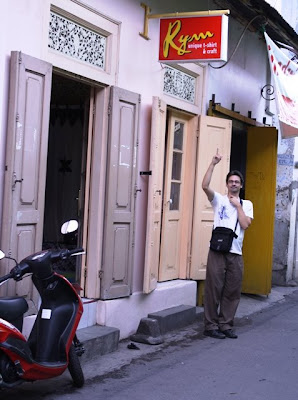Every year when Idul Adha rolls around, the sidewalks of Jakarta fill up with goats and cows.
 Excuse me, I have an urgent phone cow
Excuse me, I have an urgent phone cow
Every Muslim of means is supposed to buy an animal, or at least part of one, to be slaughtered on the Day of Sacrifice. You get to keep a third of the meat; the rest is given to the poor. For some people, it's the one time they eat meat all year.
I always tell Chad we should buy a leftover goat the day after Idul Fitri -- when there are sure to be big discounts -- and keep it in a little tent on our rooftop terrace. It could eat our garbage and we could sell the manure as compost. I used to think we could make goat cheese, too, but it turns out all the Idul Adha goats are male.
 A handsome pet
A handsome pet
Chad proved to be unreasonably resistant to the pet goat idea again, but we decided we would participate in the charitable part of the scheme and buy a goat to sacrifice. Our downstairs neighbors, Drew and Melanie, offered to chip in too.
We asked a few people how much we should pay, including Bu Dena, the woman who runs the warung across the street. She offered to take us to a friend who was selling them.
That afternoon, Dena led us to a perfectly ordinary house a couple of streets over. We were confused because there was nary a goat to be seen -- just some construction debris and sand.
 Dena at the goat house with two of her kids, Dina (left) and Putri
Dena at the goat house with two of her kids, Dina (left) and PutriOnly when you walked up the driveway and looked into a sort of carport on the left did you see a couple dozen of them, held in by a wooden gate.
 Hidden goats
Hidden goats
Dena's friend led out a few different goats for us to look at. The first cost 1.9 million, or about 170 dollars -- within our expected price range of 1 to 2 million, but a little more than we wanted to pay. The second was 1.7 and the third, a much smaller one, was 1.2. Being pragmatic types, we settled on Goat Number 2.
I told myself not to fall in love with our goat, but of course I did. Instantly. This was a bad move.
Once we paid, the next step was to take the goat down to the mosque, where he would stay for the next couple of days until his moment of sacrifice. As it turned out, Goaty didn't want to go to the mosque. He bucked and balked and shouted in a terrible, almost-human voice. It took all the goat-man's persuasion to get him around the corner and down the street.

When we finally completed our melancholy Dead Goat Walking journey, Chad registered Goaty for the sacrifice and got our receipt. The mosque would handle the slaughter and the distribution, including delivering our portion to our door. I was relieved to get our part of the process done with.

On the walk home, as I was still struggling with goat-related sadness, Bu Dena turned to us and asked an odd question: "Have you seen my husband?"
Chad and I looked at each other and scratched our heads. Come to think of it, we hadn't seen him around in a while.
"He's left me," said Dena with a funny smile. "He's already married some other woman across town."
I was floored. I didn't know what to say -- partly because of language limitations and partly because it was so shocking. Those two have seven kids together, plus some more from previous marriages. And I had just taken all those photos of him a few months before, playing the proud daddy at their
baby-naming. The betrayal was staggering.
"Amazing, isn't it?" Dena went on, still with that odd smile on her face. "For Jakarta men, marriage is a hobby!"
I wanted to call her ex terrible names, but the kids were crowding all around so I felt I shouldn't. I shook my head and told her I was very sad, and that it was, indeed, amazing.
We walked the rest of the way home thinking about goats of all kinds.































